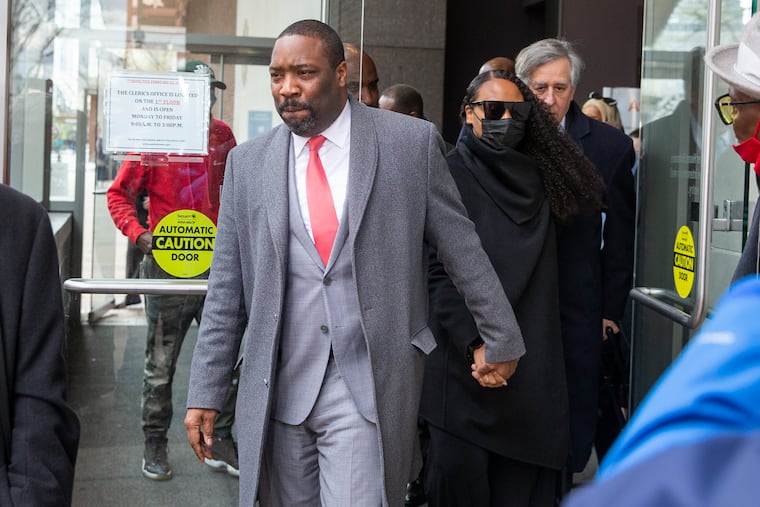A judge has declared a mistrial in Philly City Councilmember Kenyatta Johnson’s case. What happens now?
What we know about what happens next, now that a mistrial has been declared in the Philadelphia City Councilmember's federal bribery trial.

Philadelphia City Councilmember Kenyatta Johnson’s federal bribery trial ended in a mistrial Tuesday, after jurors were unable to reach a unanimous verdict despite 25 hours of deliberations.
So what happens now?
Why was a mistrial declared?
U.S. District Judge Gerald A. McHugh dismissed the panel of eight men and four women after four days of deliberations, thanking the jurors for their work and announcing that, after conferring privately with the foreperson, “the jury has reached a deadlock and sending them back to deliberate any further may be coercive.”
By Tuesday afternoon, McHugh said jurors had sent a total of three notes to the judge saying they were having trouble reaching a consensus.
» READ MORE: As it happened: Mistrial declared in Kenyatta Johnson federal bribery trial after jurors say they’re deadlocked
He noted he had seen “a certain look of dismay and frustration on their faces” after days of deliberation in the five-week trial and said that “the tone, the tenor, the content” of the jury’s final message to the court was different from previous communications.
“We are unable to unanimously come to agreement,” the note said. “Individuals from both sides do not believe that any additional evidence will change their minds.”
Over five weeks of trial, prosecutors had put on a largely circumstantial case — relying on business records, emails, invoices, and timelines — to support their allegations that Johnson had accepted $67,000 in bribes in exchange for using his position to financially benefit a nonprofit in his district.
Is this the end of the case?
No. A spokesperson for the U.S. Attorney’s Office said Tuesday that prosecutors are committed to retrying Johnson, Chavous, and the two former Universal executives on bribery charges.
A retrial would give both sides an opportunity to rethink their presentations, the witnesses they called, and revise their trial strategies before a second trial would begin.
Attorneys for Johnson and Chavous said they would ask prosecutors to reconsider.
“We’ll ask them to use their discretion more wisely this time than last time,” said Johnson’s attorney, Patrick Egan. “The issue in this case was that there was no evidence. Fortunately some of the jurors obviously saw it that way also as well. We believe that that won’t change because there is no evidence because my client did nothing wrong.”
What was the split among the jurors?
That remained unknown Tuesday. The judge did not poll jurors on the reason for the deadlock or the split among them. All of the jurors declined comment as they left the courthouse.
When would a new trial begin?
McHugh did not immediately say how quickly he hoped to schedule a new trial for Johnson and Chavous or a second phase of the proceedings that jurors were supposed to hear immediately after the verdict involving their codefendants — Rahim Islam and Shahied Dawan, two former executives at the South Philadelphia nonprofit Universal companies who face additional charges other than the alleged bribes paid to the councilmember and his wife.
What’s the second phase of the trial?
Islam, the former CEO of the affordable housing nonprofit and charter school operator Universal Companies, and Dawan, Universal’s ex-CFO, face charges of embezzling more than $600,000 from the organization over a period of years and bribing another official in Milwaukee as part of Universal’s efforts to expand operations into that city.
McHugh split the original 2020 indictment into two cases, ruling that the additional allegations against the nonprofit executives might prejudice the jury against Johnson and Chavous, who are accused in only a portion of the indictment.
Presumably, that second phase will now be heard after Johnson and Chavous’ retrial.
What happens to Johnson’s Council seat?
Because he has not been convicted, Johnson will remain on City Council pending the outcome of a second trial. Should prosecutors decide not to retry the case, he’ll be in the clear. But if a second trial leads to a conviction, he will be forced to give up his position and pension.
As he left the courthouse Tuesday, the three-term Democrat said he was eager to “continue fighting on behalf of the residents that I represent in the Second Councilmanic District.”